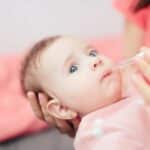A sweaty newborn isn’t that common since their delicate bodies tend to stay on the drier side. That doesn’t mean that they don’t have the ability to sweat right at birth though.
To prep their sweat glands, it’s good to cover their bodies with oils, or lotions the first weeks after delivery while their first layer of skin naturally peels away from being submerged in liquid for the last nine months.
Even though newborns don’t sweat much during the first few weeks of their lives. You’ll most likely know your newborn has been producing sweat by the way they smell before anything else.
Sweat is filled with electrolytes, bacteria, and sodium. All of these things combined might cause an undesirable smell even if parents don’t recall seeing them sweat all that much.
Therefore newborns and babies do have the ability to sweat, but their sweat glands aren’t in full swing right after birth.
When Do Sweat Glands Fully Form In Infants?
While a fetus is busy growing in their mother’s womb, they’ll fully form two types of sweat glands by 4 and 5 months gestation: the eccrine and apocrine glands.
Each of these glands plays out a very important role in a human’s sweat cycle but these glands aren’t 100% producing sweat until about 2 weeks of age after birth.
The first place sweat glands form is on their palms and the soles of their feet. These specific glands are first present in 4 months gestation.
Then, over the course of the next and 5th month, their entire bodies become covered in sweat glands in various areas.
When Do Sweat Glands Become Fully Active After Birth
During the first two weeks after birth, only the sweat glands that are located on their forehead function. Yet, shortly after two weeks of age babies begin to sweat on their torso, arms, and legs once their nervous system takes control of their bodies.
From birth to adulthood, the number of sweat glands that are on the human body doesn’t change at all. In reality, this means that infants have the highest number of sweat glands per surface area (8-10 fold higher than adults).
When infants grow through childhood, a small number of brand new sweat glands are produced. Yet, the majority of their sweat glands simply spread out as their skin grows.
Premature Babies Are A Slightly Different Case
If your baby is born prematurely, they’ll need help by caregivers to control their body temperature completely.
View in gallery
Their sweat glands cannot produce sweat at all, until at least 37 weeks. This means they have no ability to control their body temperature until then. The human body is truly remarkable.
Is There Any Reason For Concern Over A Newborns Sweat Rate?
Once babies sweat glands are fully producing sweat, parents generally become concerned about their babies sweating too much. Sweating is usually not a cause for concern.
Infants are getting a generous amount of hydration from breastmilk and water once they are ready for it. During an interview with the Chief Medical Officer at Dermira, he stated that too much sweat is not a cause for concern.
Parents should be more concerned if their children aren’t producing sweat. This is indicative of an abnormal brain development that shows they don’t have proper neuron activity in the hypothalamus that is the human’s natural heat sensor.
Dr. Hunter reassures caregivers that sweating is a positive sign of the brain’s optimal functioning ability, and temperature regulation system.
What If My Baby Has Night Sweats?
If your baby has bouts of sweating profusely while in a deep sleep, there is usually no reason to worry. Adults and babies alike find that their bodies sweat quite a bit when they’re in a cycle of a very deep sleep, as opposed to lighter REM sleep.
View in gallery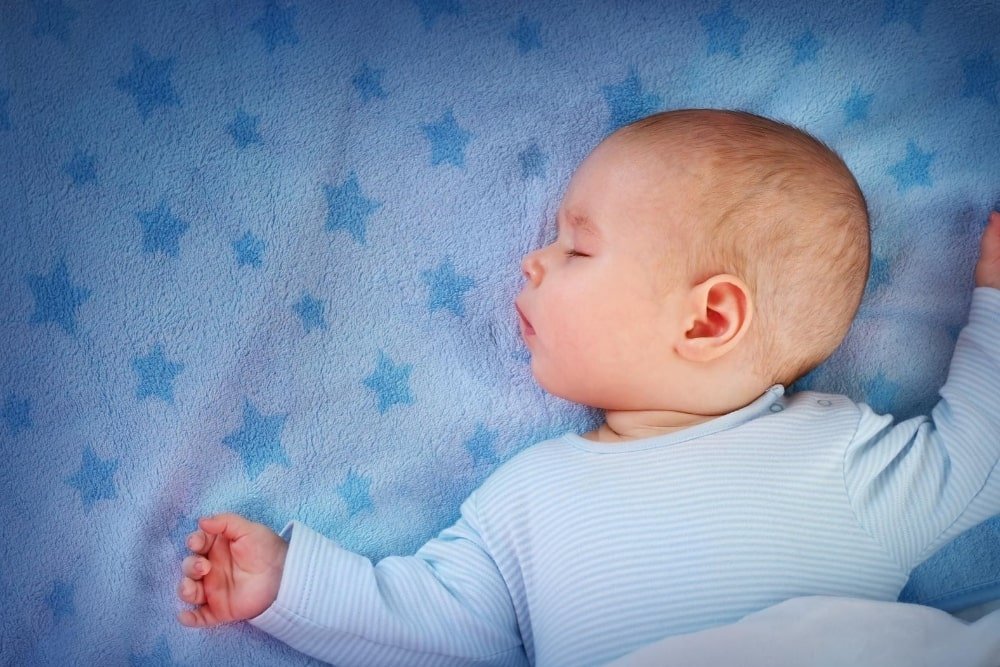
Babies sleep a lot, sometimes 16 – 18 hours a day. Most of which are broken into chunks of about 3-4 hour sleep cycles.
The majority of these shorter cycles are lighter drowsy sleep or REM sleep where they have active rapid eye movement or just feel drowsy. But, in some of the deeper cycles, some babies (and adults) go through a rapid sweat cycle, making them sweat profusely.
If you find that your baby is prone to profusely sweating during their deep sleep cycles, there is no reason to worry. Body chemistry decides on whether you baby will sweat more or less during their deep sleep cycles.
Other Causes of the Night Sweating
Movement
When babies are up and on the move, their little bodies have an amazing way of cooling down. Even when it’s hot in the environment, but when there is a lack of movement, the core temperature of the body rises.
What that looks like from the outside is a sweaty sleeping baby.
Common Cold
If you notice other symptoms alongside sweating, it could be due to the common cold. Our body’s natural response to infection or illness is to combat it with a fever.
Often when babies have a common cold, they’ll go through a lot of sweating while on-the-mend. This flushes out the cold virus through sweat glands.
Be sure to offer plenty of fluids to your baby if you’re noticing cold-like symptoms along with more sweat.
Allergies
Babies who are allergic to something will show signs similar to a common cold, with night sweating. They could be allergic to something as simple as the laundry detergent used on bedding or food they have ingested.
Look for signs of allergic reactions like a runny nose or a skin rash.
Sleep Apnea
Sleep apnea has been identified as one of the leading causes of excessive sweating during the night for babies, due to the body becoming overworked.
When a child suffers from sleep apnea, their bodies will work hard to continue breathing in the timeframes their breathing has been ‘paused.’
This shows up as excessive sweating in infants, with other tell-tale signs of lack of oxygen such as bluish skin or wheezing in their sleep.
Congenital Heart Disease
Babies with congenital heart disease have to work hard at all times to keep blood flowing throughout their little bodies properly. One in every 125 babies will develop a structural blood flow blockage while still in their mother’s womb.
The defect might send blood to the wrong place or proper flow might be blocked completely. Babies who have this condition sweat constantly during play and sleep to have an efficient body function.
Tips To Encourage Positive Sweat and Hydration Cycles in Babies
In the summer months, or if you live in a relatively hot climate year-round, it might seem intimidating that your baby is sweating at an increased rate.
View in gallery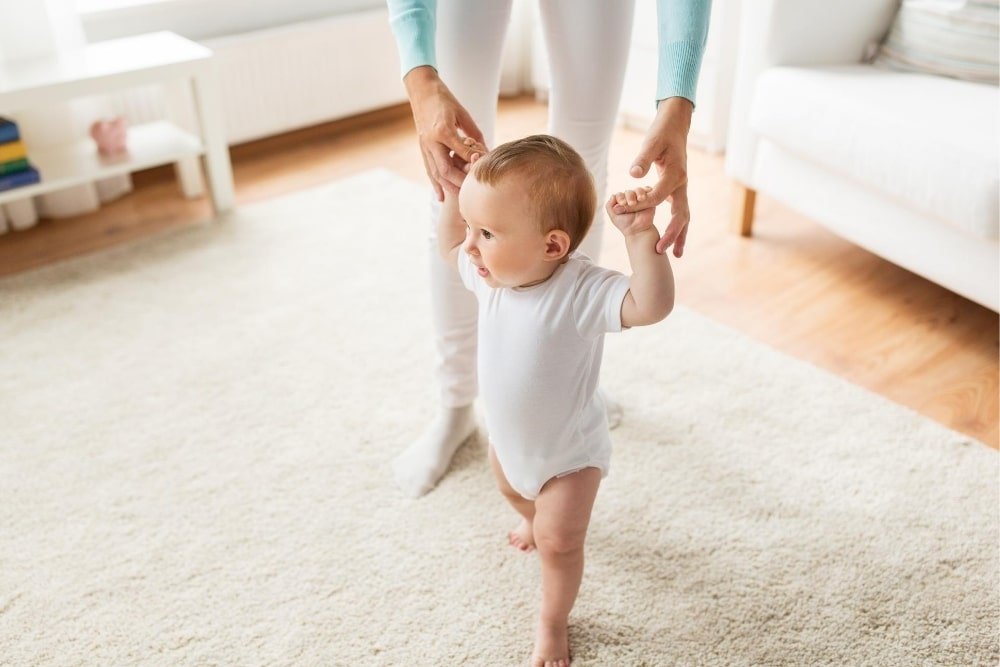
The good news is that our bodies are designed to know exactly what to do to survive, especially if they’re given proper care and attention.
If you’re a first-time mother who is having a baby in the summer months, or if you recently moved to a higher temperature location, you’re going to want a few tricks up your sleeve to avoid dehydration and heatstroke.
I know I wish I had researched this before the few trips to Urgent Care with a lethargic baby who was really just dehydrated.
Dehydration and heatstroke can be fast-acting and detrimental to infants, babies, and even toddlers.
As long as you stay on top of it, you’ll stay ahead of the sweat game while gaining confidence as a caregiver to small children during their times of high sweat rates.
Keep Your Baby Hydrated
Infants and toddlers will get dehydrated faster, and more often than adults if their hydration needs are not being met consistently.
Dehydration happens fast once it is happening. This is why parents need to be aware of the signs of dehydration caused by extra sweating or high-temperatures.
Since babies can’t communicate to us in a verbal way that they are extra hungry, it’s up to us to recognize the physical symptoms they display early on.
It’s important to know when to contact the family doctor, in case of more severe dehydration. Even parents who least expect to have a doctor visit due to dehydration would be surprised at how quickly, and seemingly out-of-no-where it occurs.
Babies and toddlers need more than adults do to survive and stay hydrated. This is because they become dehydrated much more quickly than adults and they also filter through fluids in a shorter time to keep their organs functioning, and feeling well.
Due to the fact that babies’ metabolic system functions at a much higher rate, they are more susceptible to vomiting or diarrhea alike puts them at more of a risk for dehydration to happen.
The Pinch-Test
View in gallery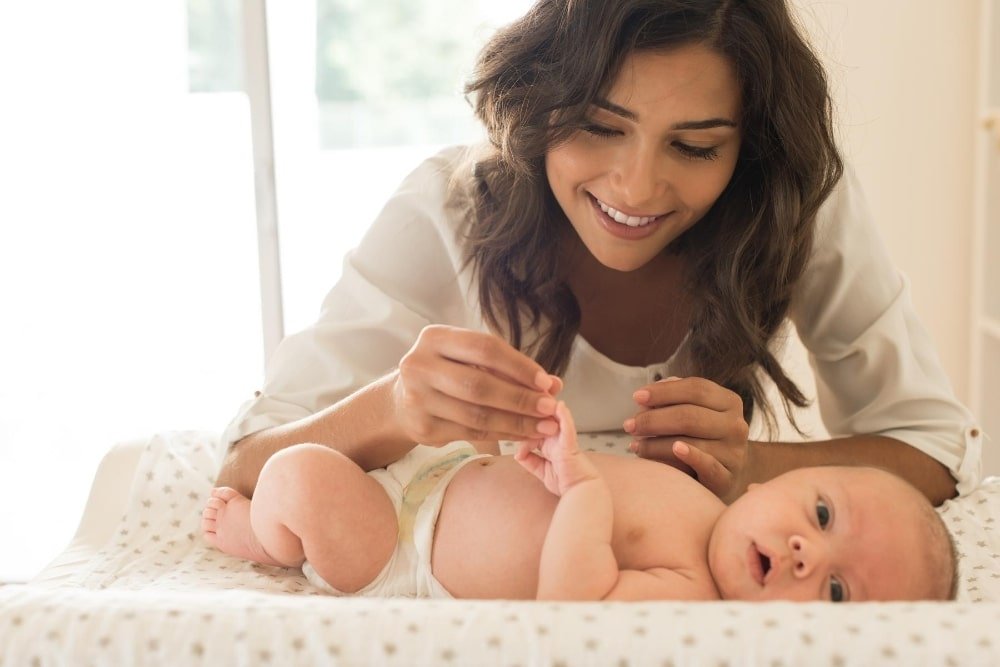
You can check for the early stages of dehydration through the pinch test. Simply pinch a bit of skin on the back of your child’s hand or wrist.
If it bounces back, they’re well-hydrated. If the skin tents or indents for a short period of time, you will know they are in the early stages of dehydration.
The Mucous Membrane Test
Babies and toddlers alike should have tons of saliva in their mouth, should have tears when crying, and have plump lips. The exception to this is babies in their first two weeks of life don’t produce tears while crying.
Carseat care
Dress your baby appropriately for the weather at hand, as parents, we know when our babies are too hot.
If it’s a hot day, no shirt and the diaper might be best, especially because overdressed babies tend to get rashes on their skin where their diaper sits if they get too sweaty.
If your baby seems warm to you, but a relative is insisting you put a jacket on your baby, always go with your instincts because you know your little one best.
Cooling Rags
Another great way to combat the heat in the summertime is to prepare a few cooling rags for car rides. Soak a small wash clothe in a bit of water, throw it in the freezer, and just before heading out hand it over to your baby in their car seat.
They can chew on it and absorb a bit of liquid while out as well.
Liquid Nourishment Outside of Breastmilk
View in gallery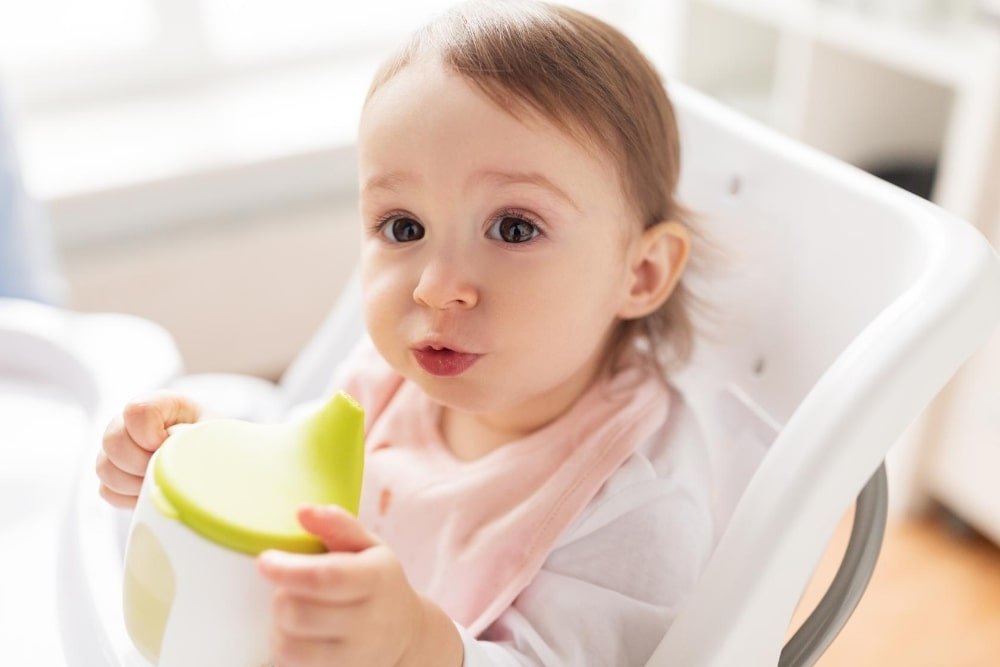
Babies under 6 months of age who are generally healthy, do not need extra liquid nourishment. They can thrive purely on formula or breastmilk.
Plan to introduce water or milk around the same time you introduce solid foods. Between feedings, you can offer a bit of milk or water to your child. Juices are recommended at one year old.
When To Rehydrate
Aim to keep your baby hydrated at all times during the day, even if they aren’t displaying they are thirsty. Offer the breast or a bottle before they exhibit hunger cues.
Feed them tons of fruits and veggies that offer hydration during meals if they eat solid foods.
The most important times to get a good dose of liquids are right after waking up, after a warm bath, or an hour before heading outside in the heat.
Make sure to bring enough liquids to sit in the shade with and sip on while at the park, offer milk or water about every 20 minutes while outdoors to babies.
Conclusion
Sweating in babies isn’t a general reason to worry about it. Though there are some underlying causes of reasons babies with certain conditions will tend to sweat more.
Parents are advised to see a pediatrician if their babies are displaying other symptoms alongside excessive night sweating, like a runny nose, or wheezing.
Sweating overall in babies is a healthy sign that their body and brain is functioning at full capacity. Sweating is natural for humans of any age to do as a way to cool the body down, remove toxins from the body, and flush out common colds.
Some babies will have excessive night sweating in their deep sleep, but this will be nothing to be concerned about.
Sources
Why Don’t Newborns Have Tears or Sweat?
Do Babies Sweat? Science Explains This Bodily Function
Baby Sweating While Sleeping – Causes & How to Deal With it
Sweating While Sleeping in Newborns
Is Your Baby Or Toddler Adequately Hydrated?

